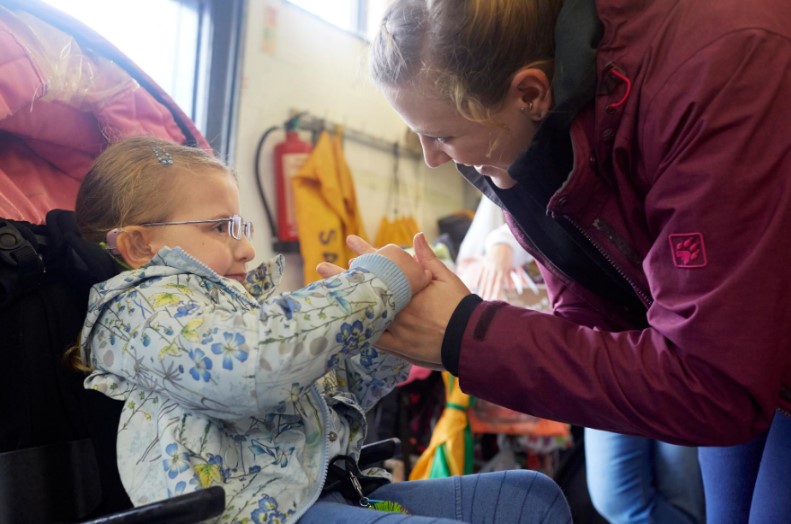A day in the life of a multi-sensory impairment teacher
Laura is a multi-sensory impairment (MSI) teacher based in Manchester. She explains what an MSI teacher is and the crucial role MSI teachers play.

It’s not easy to describe a day in the life as a multi-sensory impairment teacher as every day is different. I’m part of a specialist team within Sense that’s specifically geared to support children and young people who are deafblind or multi-sensory impaired.
When a child has multi-sensory impairment, it means that they have trouble with both their hearing and vision, and this affects how they communicate, get information and move around. It doesn’t necessarily mean that they are totally deaf or totally blind, and it’s not about the amount of sight and hearing you have. It’s about the combined impact of having more than one sensory impairment, and the affect this has on how someone experiences the world.
That’s why it’s so important that children and young people with MSI have the support of specialist teachers to help them progress and get the most out of life.
We support disabled children to achieve their potential
My background is in mainstream early years teaching. Following a very persuasive friend’s plea for help on a voluntary holiday for children with SEND (special educational needs and disabilities), I discovered I absolutely loved it. I started working as a teacher in a SEND school and found there was so much to learn.
A specialist team of teachers supported me to adapt my teaching for a deafblind child with profound vision and hearing impairments. The child’s ability to learn language through hand-under-hand sign was staggering. Without the support of the specialist team, I would have been at an absolute loss.
Working with children with MSI and their families is such a privilege. My role can include everything from running groups for pre-schoolers, attending family days in the community, offering support in a school, or working alongside families and professionals that want guidance. Working with a new child means putting put on my detective hat and using my expertise to help families understand what’s working well and where we can improve things – both in the classroom and beyond.
MSI teachers coordinate education and care
MSI teachers play a vital role in helping to coordinate education and care for disabled children and young people. At Sense, we build links with services across the region. There’s many people involved in supporting children with MSI and it’s important that everyone works together.
We join the dots between different professionals and plot out the best timetable of learning and support for children. Our role is to recognise a child’s potential, the barriers they experience to learning, and figure out how we help them to fulfil their goals. We also provide a huge amount of support to families and parents.
When families first come to Sense, they can feel really overwhelmed by a new diagnosis and the challenges of navigating the world of SEND. Learning about multi-sensory impairment is something families often need support with, and this is where our skills are most needed.
Having the support of a trained professional is life-changing
Every child has the right to an education. And that shouldn’t be any different for children with MSI. But sadly, I see families struggle to get access to specialist teachers like me. I work alongside local authorities to support families and help to fly the flag for MSI provision, but there’s a real shortage of teachers at the moment.
Without the right support at school, a child’s potential can be missed. They can struggle to access what’s going on around them and become disengaged as a result. Many individuals I’ve supported have progressed much quicker and started learning new skills when they are supported by a specialist teacher. It can be life-changing.
The availability of MSI teachers varies hugely
The availability of MSI teachers also varies hugely across the country. I’ve worked with families and children who’ve had fantastic support in one area and moved regions only to find the same support isn’t available in the new area. This hugely impacts a child’s chance to learn and grow.
Having the help of professionals who specialise in deafblindness is also transforming for families who might be struggling to understand how their child is communicating or what the next steps are to help them express themselves.
I genuinely feel like my work makes a difference to the children, young people and families I support and every day I seem to learn something new. But I also see the challenges families face and worry that without greater investment to train specialist teachers, more children with MSI will miss out on having the best start in life.
We must recognise the essential role that MSI teachers play for so many disabled children, young people, the professionals working with them and the families that raise them.
Join us to campaign for change
Join the Sense campaigns network and get all the latest on our campaigns for the rights of people living with complex disabilities to take part in life.

